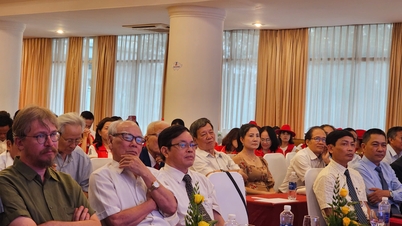The development of technology, social networks and the fast pace of life can cause many people, regardless of age, to fall into a state of stress and disconnection with themselves and those around them. It is easy to see images of family members sitting together in cafes or restaurants, or even in the family living room, with each person focusing on electronic devices instead of talking to each other.
 |
| Big family happily eating together. Photo: Internet |
This reality makes the concept of “mindfulness” - a mental capacity that heals and nourishes people from within - increasingly interested as a comprehensive and sustainable educational method. “Mindfulness” or “awareness” is the ability to clearly and non-judgmentally recognize what is happening in the present, from emotions, thoughts, behaviors to environmental stimuli. In education, “mindfulness” is not simply the ability to concentrate, but also the foundation for developing emotional intelligence (EQ), the ability to self-regulate, control emotions and develop empathy.
In the digital age, when children's lives are often dominated by electronic devices, social networks and academic pressure, the ability to "pay attention" becomes even more important. A child with the ability to "pay attention" will know how to slow down, listen to their inner self, avoid being swept away by negative emotions and thereby have the ability to learn and communicate effectively. Therefore, bringing mindfulness education into the living environment, especially in the family, is not only a trend but also a strategic need in comprehensive education.
The family is the first educational environment that has a profound and long-term influence on the development of a person's personality. If the school is the place to impart knowledge and skills, the family is the place to nurture the emotions, ethics and inner world of children. In "mindful" education, parents are not only teachers but also "practicers" with their children, through their own lifestyle and daily interactions. "Mindful" education does not require overly complicated methods or high financial demands. The core is the commitment and awareness of parents in building a family lifestyle.
When parents eat meals with their children without rushing, go for a walk with their children without scrolling through their phones, breathe slowly with their children, feel the beauty of nature or simply share their feelings sincerely, children gradually form the habit of living mindfully and connecting deeply with life. On the contrary, in families where parents are often stressed, react negatively or are too busy with work, communication with children is replaced by technological devices, children easily fall into a state of emotional turmoil, lose focus and distance themselves.
Therefore, educating “mindfulness” in the family is not something too far-fetched or difficult to do. It starts with small changes in attitude, in the way parents are present and interact with their children every day. When the family becomes a place to cultivate “mindfulness”, not only are children nurtured comprehensively, but society itself is also built on the foundation of awareness, love and peace.
Source: https://baodaklak.vn/giao-duc/202505/giao-duc-chu-tam-trong-gia-dinh-a2c1850/


![[Photo] President Luong Cuong presents the decision to appoint Deputy Head of the Office of the President](https://vphoto.vietnam.vn/thumb/1200x675/vietnam/resource/IMAGE/2025/5/8/501f8ee192f3476ab9f7579c57b423ad)

![[Photo] Prime Minister Pham Minh Chinh meets with the Policy Advisory Council on Private Economic Development](https://vphoto.vietnam.vn/thumb/1200x675/vietnam/resource/IMAGE/2025/5/8/387da60b85cc489ab2aed8442fc3b14a)
![[Photo] National Assembly Chairman Tran Thanh Man chairs the meeting of the Subcommittee on Documents of the First National Assembly Party Congress](https://vphoto.vietnam.vn/thumb/1200x675/vietnam/resource/IMAGE/2025/5/8/72b19a73d94a4affab411fd8c87f4f8d)

![[Photo] General Secretary concludes visit to Azerbaijan, departs for visit to Russian Federation](https://vphoto.vietnam.vn/thumb/1200x675/vietnam/resource/IMAGE/2025/5/8/7a135ad280314b66917ad278ce0e26fa)

















































![[Photo] Prime Minister Pham Minh Chinh talks on the phone with Singaporean Prime Minister Lawrence Wong](https://vphoto.vietnam.vn/thumb/402x226/vietnam/resource/IMAGE/2025/5/8/e2eab082d9bc4fc4a360b28fa0ab94de)































Comment (0)